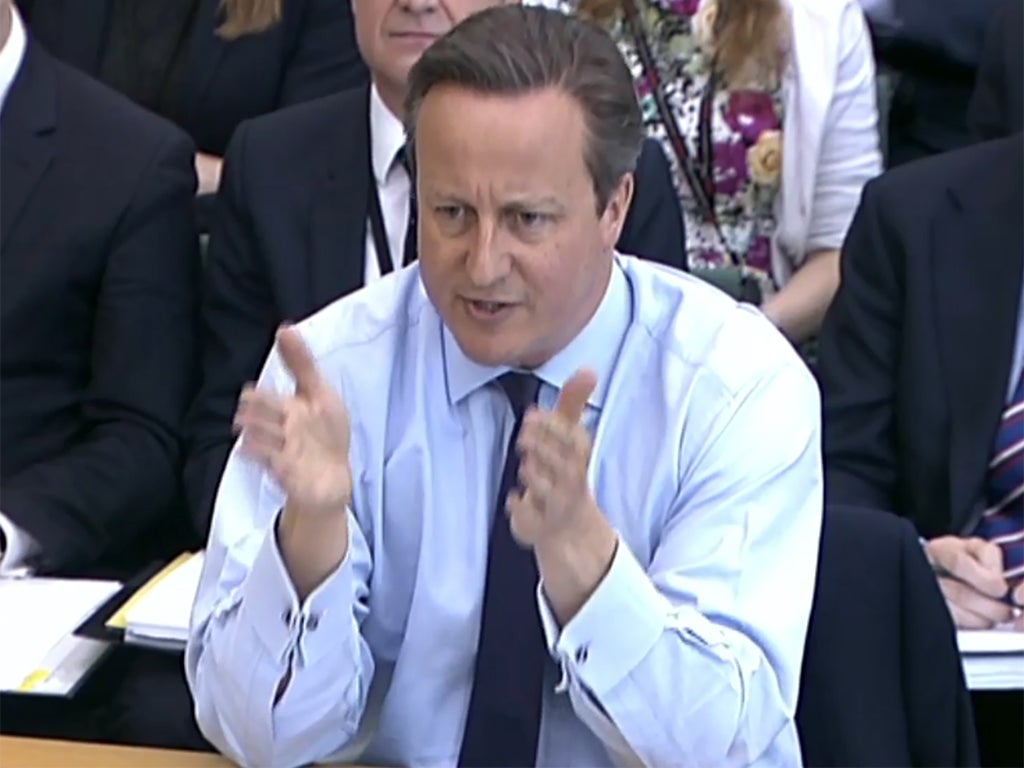The mouthy male bravado of Cameron and Corbyn makes me think we have a masculinity problem in politics
In politics, unlike real life, changing your mind is seen as a sign of weakness, whereas women have known for years that compromise is a way of getting things done


“The need to be hard is holding men back,” according to Grayson Perry, in the first part of his insightful series about masculinity on Channel 4 this week. Perry starting by talking to cage fighters in the North-east, where 80 per cent of the suicides are male and there are 14 deaths a month. An inability to express emotion must be one of the reasons that suicide is now the biggest killer of men under 45, along with a fear of failure.
Machismo and mouthy bravado is not just confined to tattooed cage fighters or city traders - ugly posturing has moved into politics. In the former mining communities where Grayson filmed, many men seemed to have lost their way- no longer the breadwinner, and the traditional roles in the household have been reversed. One man admitted that fighting ‘made him feel better…it calms me down’, as if it was the only way to express his inner turmoil.

An inability to express your emotions in a non-confrontational way is not confined to the working class. David Cameron started his career as a PR man, paid to use his charm and people skills paid to smooth things over and promote his clients- so what’s happened? Over the past couple of years in office, he’s morphed from a touchy-feely politician photographed with huskies, a man who cried when talking about his disabled son, to a red-faced belligerent shouter, displaying appalling manners at Prime Minister’s Questions. He’s stooped to the kind of cock-fighting bravado worthy of an episode of Peaky Blinders. Forget “Calm down, dear” – one of his early ill-judged putdowns to a female MP - he’s ramped up the invective in recent months as he’s coped with a narrow majority in the House, divisions in his party over the EU and falling popularity ratings.
To deal with all this, the well-mannered charmer has left the building and been replaced by a suited cage-fighter. Cameron described Donald Trump as “stupid” when the prospective Republican candidate called for Muslims to be banned from entering the US. As Trump’s campaign has gathered momentum, in spite of attacks from the left, minorities and women, the PM has refused to apologise. This week he softened his stance fractionally, acknowledging that anyone who has gone through the primaries “deserves respect”. How can you respect a man you think is “stupid”? That inconsistency insults voters. Trump may be a lot of things, but he’s not dumb.
Cameron’s rage at PMQ’s this week was directed at Jeremy Corbyn’s refusal to apologise for once describing Hamas and Hezbollah as “friends”. Is this a major policy issue like the NHS or tests for schoolchildren? I think not. Corbyn may not look like macho-man in his ghastly tracksuits, but (in his own pig-headed way) he’s just as inflexible. The Labour leader won’t apologise for Ken Livingstone’s recent remarks; he has simply ordered an inquiry.
Voters are repulsed by the shouting match that politics has become. Even the mild-mannered Zac Goldsmith slagged off Sadiq Khan in London’s mayoral election, playing the race card in order to try and discredit his opponent. Boris Johnson was no better when he brought up Barack Obama’s “part-Kenyan heritage” in a political column. If that’s not ‘dog whistle’ racism I’m a chipolata - and yet the PM didn’t call for Johnson to withdraw his remarks or offer an apology.

The turnout for the local and mayoral elections this week was low, and yet there were some excellent candidates. The Women’s Equality Party and the Greens, for example, operated under the old-fashioned rules where manners matter and policies are explained. What do the main parties actually stand for? The EU referendum has hijacked any serious discussion about policies as both sides promote a campaign of fear to bully us into voting for them. Post-referendum, what will the Tories actually stand for? I have no idea.
This week, the government reversed their position on accepting child refugees - a very small sign of flexibility. In politics, unlike real life, changing your mind is seen as a sign of weakness, whereas women have known for years that compromise is a way of getting things done and moving forward. Modern party politics are mired in machismo, and it’s turning voters off.
Join our commenting forum
Join thought-provoking conversations, follow other Independent readers and see their replies
Comments
Bookmark popover
Removed from bookmarks